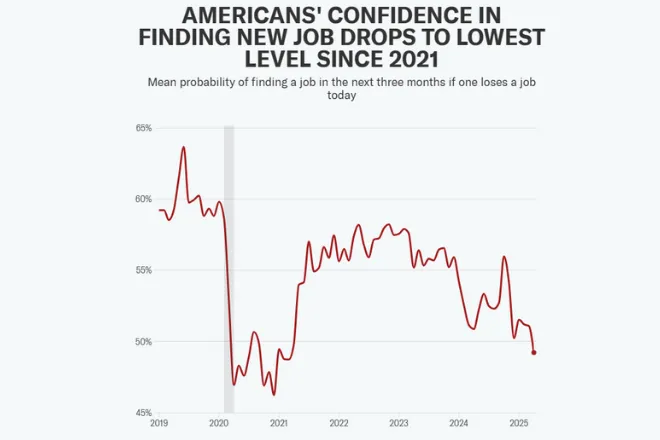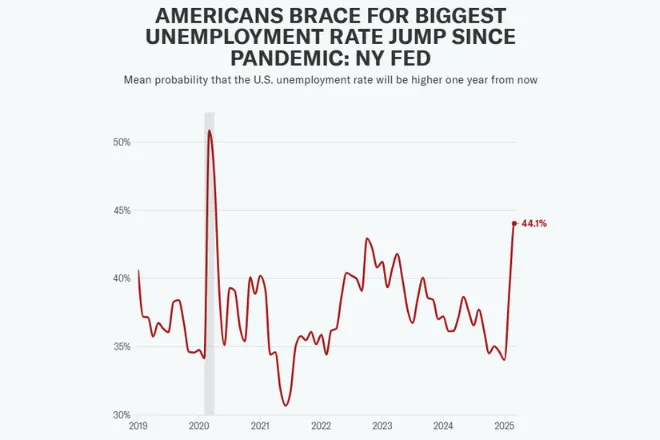Americans are experiencing their lowest confidence in finding new employment since early 2021, according to the latest Federal Reserve Bank of New York survey released Thursday. The drop in optimism occurs even as the U.S. labor market continues to demonstrate strength and stability.
Contents
Americans Report Diminishing Job-Finding Confidence
Compared to the previous survey, the comprehensive survey found that Americans now estimate the probability of finding a new job within three months if they lose their current one is 49.2%, down 1.9 percentage points. This is the lowest level since March 2021, despite steady labor data.
The April jobs report contradicts United States residents’ pessimism, showing the U.S. economy added 177,000 nonfarm payrolls, substantially exceeding economists’ predictions of 138,000. The unemployment rate remained unchanged at 4.2%, suggesting the labor market remains resilient despite former President Trump’s recent tariff announcements on “Liberation Day.”

Americans’ Outlook on Future Employment
Despite the solid job numbers, many Americans remain cautious about their job prospects. The Fed survey found that median unemployment expectations — the probability that the national unemployment rate will rise within a year — edged up 0.1 percentage point to 44.1%, still the highest since April 2020.
Some positive indicators emerged for specific groups of United States residents. The expected likelihood of becoming unemployed in the next 12 months decreased by 0.4 percentage points to 15.3%, with U.S. citizens over 60 and those with a high school education or less showing the most significant improvement in outlook.
Meanwhile, the probability of Americans voluntarily quitting their jobs in the next year rose slightly by 0.2 percentage points to 18.2%, but was still below the 12-month average of 19.7%. This modest increase was driven largely by those under 40, those with a college degree or higher, and households with incomes under $50,000/year.
See more related articles:
Americans Face Economic Uncertainty Amid Trade Tensions
The survey also found that Americans’ financial sentiment has deteriorated significantly both in terms of current and future expectations, especially regarding household income growth. The decline coincided with growing economic uncertainty over former President Trump’s shifting tariff policies.
Some positive developments emerged Thursday when Trump announced his first trade deal since initiating new trade restrictions: a limited agreement with the UK designed to lower barriers on goods, including automobiles and agricultural products, though many specific details remain undisclosed.
The uncertainty surrounding future trade agreements and their possible effects on inflation and the U.S. labor market has prompted many businesses and economic institutions, including the Federal Reserve, to take a cautious approach.

Americans’ Inflation Expectations Remain Elevated
Federal Reserve Chair Jerome Powell reiterated Wednesday that the central bank isn’t rushing to cut interest rates and would “wait and see” how tariffs affect the economy and the American people’s financial situations.
“My gut tells me that uncertainty about the path of the economy is extremely elevated and that the downside risks have increased,” Powell stated, adding, “There are cases in which it would be appropriate for us to cut rates this year, there are cases in which it wouldn’t. We just don’t know.”
The NY Fed survey also tracked Americans’ expectations on inflation, showing one-year inflation expectations remained steady at 3.6%. However, U.S. citizens’ three-year inflation expectations rose by 0.2 percentage points to 3.2%, reaching the highest level since July 2022.
While inflation slowed significantly in March, economists warned that new tariffs and tariffs on Chinese imports could cause prices to rise more rapidly in the coming months, directly impacting U.S. citizens.
“This could easily be the last really good CPI day for a while,” warned Claudia Sahm, former Federal Reserve Board economist and current chief economist at New Century Advisors. “The tariffs that have gone into effect [but] it’s going to take time for it to show up in the data.”
The latest inflation data affecting Americans is scheduled for release early next week, potentially providing more insight into how recent economic policies are impacting consumer prices nationwide.
